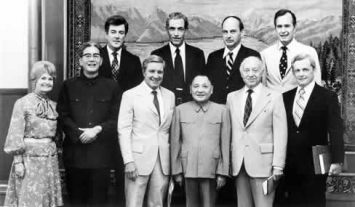
The Black Book: Lessons from American History – Abraham Lincoln to Modern China, by Senator Adlai E. Stevenson, III (The Stevenson Family, 2009, 299 pages).
Book Review by Dennis Moore
“Once a man holds public office he is absolutely no good for honest work.” --Will Rogers
September 22, 2013 (San Diego’s East County)-- The Black Book: Lessons from American History – Abraham Lincoln to Modern China is a guide-- a road map for future politicians authored by Adlai E. Stevenson III. He laments changes in the electoral process and the loss of civility in politics, also speaking of opportunities in politics being limited by money and a media which restricts comments to one or two minutes while focusing on the game, the trivial and the sensational.
The book began as a brown loose-leaf binder in which the author ‘s great-grandfather, Adlai E. Stevenson (1835-1914), collected anecdotes and maxims, stories and sayings during his life as a county prosecutor, congressman, assistant postmaster general and U.S. vice president under Grover Cleveland. His grandson, known to friends and family as “the Guv,” expanded the collection in a large black binder during his life as an official in the Roosevelt and Truman administrations, governor of Illinois, Democratic presidential candidate in 1952 and 1956, and U.S. Ambassador to the United Nations in the Kennedy and Johnson administrations.
I n The Black Book, the author combines politics and humor, stating, “The Black Book never neglects wit and humor for long. Skeptical comments reflected the frailties of democracy. But good men flourished in politics—and made light of it. Humor eflected their integrity. Besides, politicians were a gregarious lot. They loved to tell stories and jokes. The Black Book recorded them. They were useful to its authors in their discourse. Today they convey some flavor of the old politics, its spontanaeity and good nature, its honesty.”
n The Black Book, the author combines politics and humor, stating, “The Black Book never neglects wit and humor for long. Skeptical comments reflected the frailties of democracy. But good men flourished in politics—and made light of it. Humor eflected their integrity. Besides, politicians were a gregarious lot. They loved to tell stories and jokes. The Black Book recorded them. They were useful to its authors in their discourse. Today they convey some flavor of the old politics, its spontanaeity and good nature, its honesty.”
Senator Stevenson uses his ancestors, Adlai I and Adlai II, as examples of the combining of politics and humor, stating, “Adlai II’s humor was spontaneous. He could trust his instincts—and his cause. Humor from The Black Book acquires and edge in the new politics. Adlai I distinguished between wit and humor. As he put it, the gift of humor is:
The sure indicator of the humane and sympathetic in our
nature; that which blends the pathetic with the ludicrous
and by the same stroke moves to laughter and to
tears…It is not strange, then, that he who in large degree
possesses or is possessed by this subtle quality should be
subject to moods, it may be melancholy--`the effect of
that humor that sometimes hath his hour with every man.’”
Senator Stevenson contrasted the wit and humor of his ancestors with that of Abraham Lincoln, citing examples. He quotes and uses anecdotes form a number of historical characters, such as Sir Winston Churchill, George W. Bush, Edmund Burke, Thomas Jefferson, Paddy Bauler, Shakespeare and Louis Brandeis. He quotes Justice Louis Brandeis in Olmstead v. United States: “Our government is the potent, the omnipresent teacher. For good or evil, it teaches the whole people by its example.”
The author states in his book that the line between humor and wit is shadowy, not easily defined, but that Adlai I made this distinction: “While wit is a purely intellectual thing, into every act of the humorous mind there is an influx of the moral nature. Humor springs exuberantly, as from a fountain, and runs on, its perpetual game to look with considerate good nature at every object in existence, and dismiss it…While wit, the purely intellectual quality, sparkles and stings, humor `touched with a feeling of our infirmity’ would ‘gently scan they brother man.’” Stevenson makes not that Lincoln’s humor manifested these sentiments.
In a phone interview, author Adlai E. Stevenson, III, a former Illinois Senator, gave me rare and groundbreaking insight into Illinois and national politics, as well as the Stevenson family’s long and storied history in politics.
It was an honor to talk with him and ask his views on politics today, as well as insights and perspectives from his book. The interview also answered some nagging political questions that I had about Chicago politics, as a former insider there and author of my own book on Chicago politics. I particularly wanted to get the Senator’s insight on Mayor Richard J. Daley’s family and political machine, especially since it was covered extensively in his book. We shared common ground as I told the Senator I once served as a precinct captain in the Daley administration in Chicago, the same Daley Administration that First Lady Michelle Obama worked for at one time.
In his book, Stevenson indicated one of his purposes in publishing it and augmenting it with comments was to remind readers what our politics have been, what politics can be, and the state of politics in America today.
He reminds us in this thoughtful and well written book that memories are short, and that generations are disconnected from one another and from the rich American past. Throughout the Black Book, parables, aphorisms and anecdotes reappear in different versions from different times, but with the same enduring themes. The Senator reminds us that our own times seem bereft of both the timely anecdote and its enduring message, and that political fodder for the Black Book has become scarce.
Senator Stevenson repeatedly reminds us throughout the Black Book that despite the metamorphosis of American politics, there still are many courageous and sensible men and women prepared to lay down their lives for their country. The Black Book is for them. The author states, “May they gain some amusement, nourishment and strength from its bits of wisdom.”
The metamorphosis of American politics that Senator Stevenson speaks about in his book could possibly best be demonstrated by the election of the first African-American president, Barack Obama Senator Stevenson points out that a few politicians, Barack Obama included, “win at first by accident.”
He puts the ascendancy of Barack Obama to the Presidency in perspective, stating: “As I write, Presidential candidates have raised as much as $130 million nine months before the Presidential election, $50 million in one month alone. As of early February, 2008, delegates were costing Barack Obama an average of $130,000 each. With the dialogue all but dead, his public meetings acquire a revivalist fervor well known to the Black Book, as if the Second Coming were at hand for secular Americans deprived of hope in their politics and desperate for change.”
 The author indicates that some pieces in The Black Book bear remotely on the underlying themes of government, politics and peace. He adds that the book acquires dimensions in time and space, becoming more ecumenical as it proceeds. There is no singularity in The Black Book except in its humor, faith in the human spirit and reason, and aversion to the profane. Each new leaf covers a surprise. The last is in China, where Stevenson states in the book his adventures in the world will end; he titles the chapter “China and Eight Immortals Crossing the Seas.”
The author indicates that some pieces in The Black Book bear remotely on the underlying themes of government, politics and peace. He adds that the book acquires dimensions in time and space, becoming more ecumenical as it proceeds. There is no singularity in The Black Book except in its humor, faith in the human spirit and reason, and aversion to the profane. Each new leaf covers a surprise. The last is in China, where Stevenson states in the book his adventures in the world will end; he titles the chapter “China and Eight Immortals Crossing the Seas.”
Clearly the Senator’s interests go beyond American politics; this book demonstrates the vast knowledge and insight of the author.
In my phone interview with Senator Stevenson, he shared with me his long and enduring friendship and relationship with the Reverend Jesse Jackson. He spoke of the disappointment and hurt that the Rev. Jackson had with his son, the former Congressman Jesse Jackson Jr., who along with his wife have recently been convicted of political crimes and sentenced to prison. Senator Stevenson makes a memorable observation in his book in regard to Rev. Jackson, as the Reverend states about him: “Adlai, there’s just two things wrong about you as a politician. You’re too honest, and you don’t know how to talk in parables.” Perhaps that sums up this rich and insightful book about politics and human nature.
The Black Book reflects a robust partisanship. Politics was the stuff of debate and hard work in the precincts, something that I know about firsthand, not of daily denigration or entertainment on talk shows, let alone fund raisers and marketing. The people’s business was serious and joyful – their participation uncontrived.
The Black Book’s aphorisms and anecdotes highlight the contrast between our nation’s founders’ ideals and the realities of modern politics. Senator Stevenson explains all that in this well written book, a book that I highly recommend.
For more information or to purchase The Black Book, you can visit www.adlai3.com.
 Dennis Moore is a writer and book reviewer with the East County Magazine in San Diego and the book review editor for SDWriteway, an online newsletter for writers in San Diego. He is also the author of a book about Chicago politics; “The City That Works: Power, Politics and Corruption in Chicago.” Mr. Moore can be contacted at contractsagency@gmail.com or you can follow him on Twitter at: @DennisMoore8.
Dennis Moore is a writer and book reviewer with the East County Magazine in San Diego and the book review editor for SDWriteway, an online newsletter for writers in San Diego. He is also the author of a book about Chicago politics; “The City That Works: Power, Politics and Corruption in Chicago.” Mr. Moore can be contacted at contractsagency@gmail.com or you can follow him on Twitter at: @DennisMoore8.










Comments
Great job!
Continue writing. It's always great to read your insightful reviews.
Friend and colleague
Dorothy Bracy Alston
"Hurt Used To Live Here"
Thanks for your comments Joyce, I can't wait to get my hands on your book; "Hurt Used to Live Here," and possibly also write a review of it.